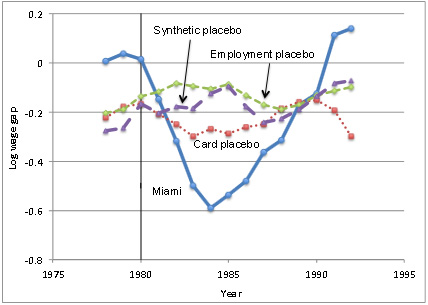Does illegal immigration suppress the wages of native-born workers? The evidence suggests that it doesn’t—or not much, anyway. One of the data points supporting this is a study done by David Card of the effect of the 1980 Mariel boatlift on workers in Miami. Even though Miami experienced a huge spike in immigrants during the boatlift, Card found no significant impact on wages.
Today George Borjas steps in with a different analysis. He’s been arguing for a long time that immigration has a bigger effect on wages than we think—especially the wages of unskilled workers. In a new working paper, he looks specifically at the wages of high school dropouts and concludes that although overall wages in Miami were unaffected by the Mariel boatlift, the wages of dropouts were affected. In relative terms, they went down by 10 to 30 percent.
I wouldn’t be surprised if this were true, but Borjas’s paper does leave me with a few questions. Take a look at the chart on the right, which shows the wages of high school dropouts relative to high school graduates. Miami is the thick blue line. The  other lines are various estimates of wages in cities that weren’t affected by the boatlift. There are a few oddities here:
other lines are various estimates of wages in cities that weren’t affected by the boatlift. There are a few oddities here:
- Before 1980 and after 1990, the wages of high school dropouts in Miami are above zero, which means dropouts earned more than high school grads. That seems very peculiar, and none of the control cities show the same effect. Does this suggest there’s something wrong with the Miami data?
- The Mariel boatlift produced a truly enormous spike in unskilled workers. Borjas estimates that it increased the number of working-age high school dropouts in Miami by about 18 percent in just a few weeks. I wonder if it’s really possible to extrapolate from this to the much more gradual increase in illegal immigrants nationwide over a span of two or three decades?
- This is especially apropos because the chart shows that the impact on wages was fairly short lived. Even with such a huge labor shock, wages of high school dropouts were only affected for about six years. By 1988 they had recovered fully. Borjas acknowledges that this is hard to account for.
I’m no expert in this stuff, and I imagine the folks who are experts will weigh in soon enough. However, even if Borjas is basically right, the question we care about is what this tells us about the effect of illegal immigration on wages more generally. If a huge spike produces a short-lived wage depression of about 20 percent or so, what does a gradual increase over a wide geographic area produce? Unfortunately, Borjas says that there was more going on in Miami during this period than just a labor supply increase, which means “it is difficult to say much about the dynamics of the wage effect of immigration from the evidence generated by the Mariel supply shock.” Intuitively, though, it seems like it would be something far less dramatic. Maybe 5 percent or so? Less?













